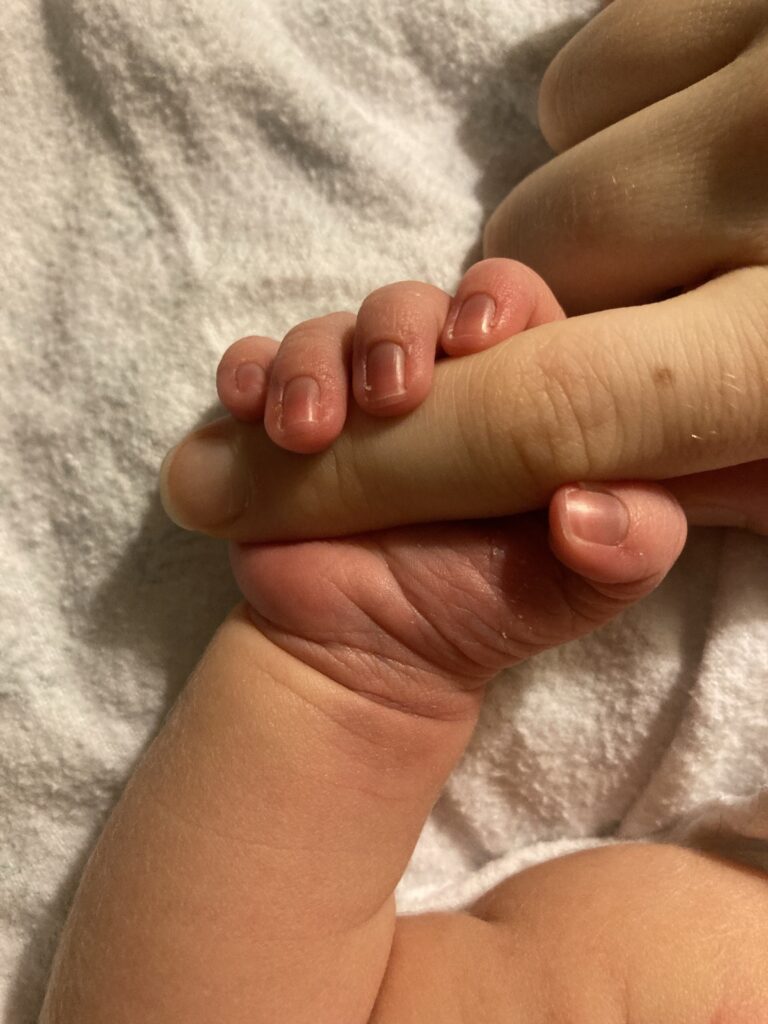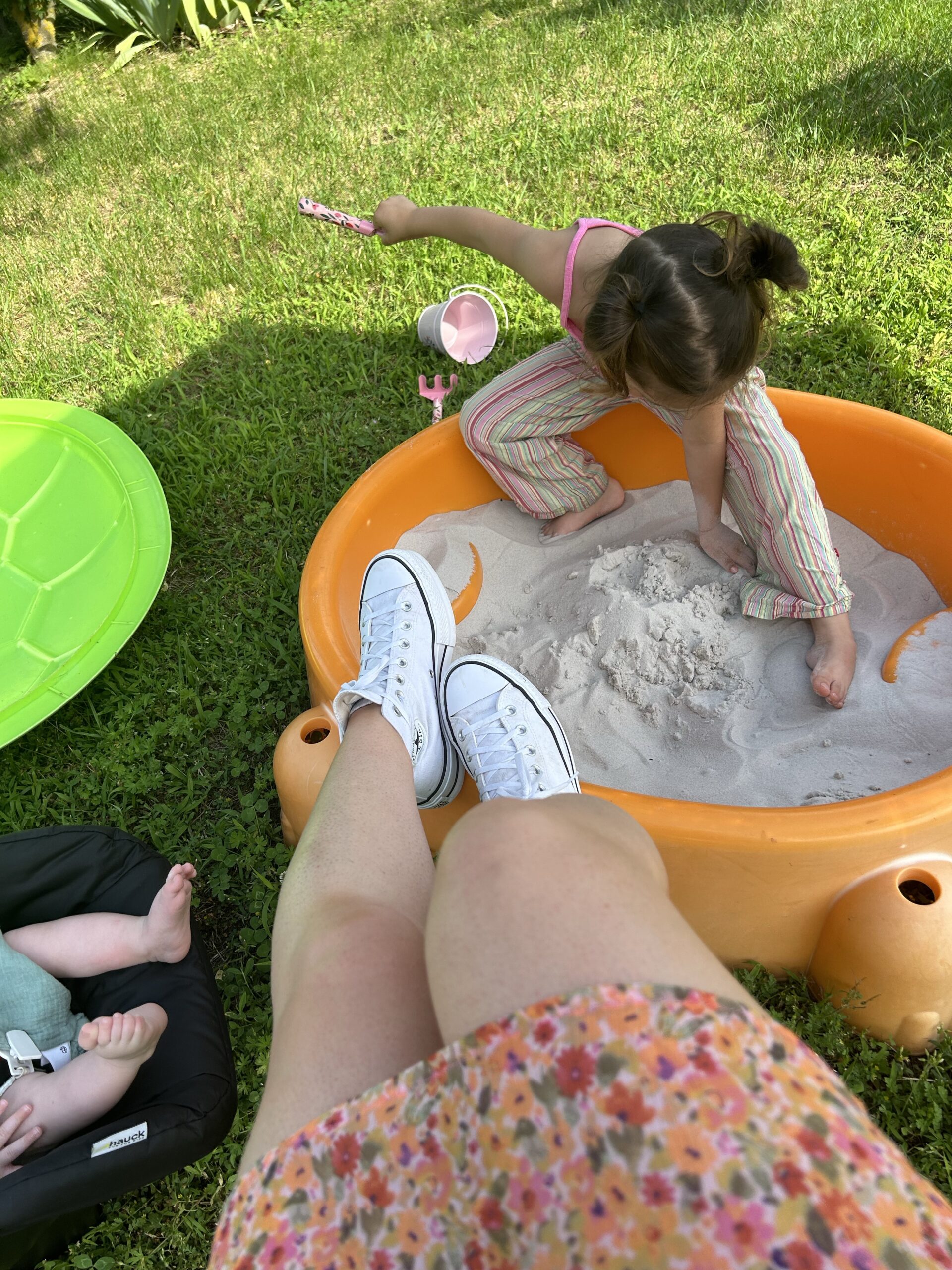
Becoming a mom is one of the biggest transitions in life. And no matter how much you prepare, reality rarely matches the expectations. Motherhood is full of surprises and challenges. Navigating these challenges can be hard when we’re surrounded by images of glowing moms with sleeping babies, pristine nurseries, and captioned posts about how “blessed” it all feels. Yes, motherhood has incredible moments, but real life is more complicated. There’s also chaos, confusion, and figuring it out as you go. Those moments rarely make it to Instagram.
We’re here to remind you that those harder, less Instagrammable moments are a normal part of the motherhood journey, too. If you’re in the thick of it and wondering why it doesn’t look or feel the way you thought it would – you’re not alone. We see you, even in the unfiltered moments.
Why are our expectations so high?
Many new moms enter motherhood with an idea of how it’s “supposed” to feel. We’ve been absorbing idealized stories for years – ones that make early motherhood look instinctual and magical. So we enter motherhood with hope, excitement, and a mental idea of how it will all play out.
These expectations don’t make you unrealistic or naive – they mean you care. You want to feel bonded, confident and connected with your baby. That hope is valid, relatable and beautiful. But when reality feels harder than imagined, it can be jarring. So let’s take a breath and look at some common expectations of new moms, and the realities that often follow.
Expectation: You’ll love every moment
Reality: Some moments are overwhelming and exhausting
The phrase “soak it all in” gets thrown around a lot. Becoming a mom can be deeply fulfilling, but truthfully, not every moment is magical. Some are messy, exhausting and repetitive. You can love your baby and still not love changing a blowout at 3 a.m. That doesn’t make you ungrateful for the newborn phase.
Especially in those early days when you’re healing, barely sleeping, and flooded with postpartum hormones, it’s normal to feel a bit off-balance. If your mood remains low, anxious, or begins to interfere with daily life, it’s okay to reach out for support. Postpartum mental health matters and you deserve the support that will help you navigate this journey.
Expectation: You’ll know what to do instinctively
Reality: You’ll be learning the ropes as you go
Maternal instinct isn’t a switch that gets flipped on when we enter motherhood. Moms learn by doing, trying and adjusting. Every mom has a learning curve, and that learning begins to happen along the way. Remember, you’ve never been here before, so you’re doing something that you’ve never done – you don’t have to “get it right” on the first try. If you struggle with perfectionism in these moments, remember that your baby doesn’t hold you to the same expectations that you have for yourself. Your love, presence, and care matter more – and you’re already providing that.
Expectation: Parenting responsibilities will fall into place
Reality: Your needs and support require ongoing communication

It’s easy to assume that things will fall into place naturally, but the reality is that co-parenting requires intentional effort and clear communication. Even in strong and supportive relationships, many moms juggle the “invisible labor” – things like managing feedings, doctor visits, and remembering what diaper size to buy.
This isn’t about keeping score – it’s about awareness. The mental load is real, and if it’s starting to feel overwhelming, it’s important to talk about it with your partner. Parenting and co-parenting isn’t always equal or immediate. This is a skill that’s built over time, and it’s an ongoing process that requires you and your partner to adjust, offer support, and continually communicate. You’re a team, and you’ve got this.
Expectation: You’ll still be “you” after the baby
Reality: Your sense of identity might shift
You don’t disappear after becoming a mom – but things change. Routines, priorities and responsibilities all look different. Sometimes, parts of you get a little quiet. If this is making you feel sad or disoriented, you’re not alone.
Honor the new version of yourself by finding intentional moments to reconnect and rediscover what lights you up: your favorite book, coffee with a friend, or just doing something for you. These small moments can help you find joy and remind you that you haven’t lost yourself – you’re just evolving.
Expectation: You’ll bounce back quickly after birth
Reality: Recovery looks different for everyone
Birth is a major physical and emotional event. Postpartum recovery includes factors like sleep, emotional regulation, hormonal shifts, and energy levels. But thanks to diet culture, many new moms also face pressure around their physical appearance and may feel shame or discomfort in a body that’s changed. That experience is deeply relatable (not even Rihanna is safe from bounce back culture), and it can make an already vulnerable time feel harder.
Check in with yourself, your partner and your doctor in terms of how you’re feeling and what choices might be best for you and your family. There’s no universal recovery timeline.
Expectation: Staying organized means staying in control
Reality: Even the best organization won’t prevent chaos
Organization is great. But babies and motherhood are unpredictable. Sometimes, even with the best organization, naps don’t happen, bottles spill, or the day just doesn’t go as planned.
This isn’t failure, it’s a relatable part of life as a new mom. Some days, you’ll reschedule plans and sometimes the idea of taking a shower might be more stressful than relaxing. Give yourself permission to adapt and take things one hour at a time.
Expectation: You’ll bond instantly with baby
Reality: Bonding can be gradual and that’s completely okay

Bonding is a process that unfolds through shared moments: holding, feeding, comforting, and learning each other’s rhythms. For some moms, the bond feels immediate. For others, it takes time. Just like other relationships in your life, your connection with your baby will grow and evolve as you get to know each other. If it’s taking longer than you expected, give yourself grace. You’re doing the work, and that connection is building.
The reality is… You’re doing better than you think
Every new mom carries her own version of expectations: some shaped by her upbringing, some by social media, some by the endless parenting books and blogs. It’s hard to shake those expectations which is why we want to remind you that real motherhood doesn’t follow a script. It’s messy, beautiful, exhausting, and constantly evolving.
Its hard not to fall into the trap of self-comparison, but we’re always here to remind you that if things feel different than you imagined, that doesn’t mean you’re doing it wrong. It means you’re in it! You’re adjusting, learning, growing. And in all of the uncertainty, one thing is true: you’re the exact right mom for your baby.
At Manhattan Wellness, we understand that the fourth trimester is a time of transition and adjustment and want to support you in prioritizing your maternal mental health during the fourth trimester. If you are interested in feeling confident in your new role as a mom, reach out to learn about therapy for your maternal mental health:
- Submit a Contact Form or Email Us at hello@manhattanwellness.org
- Learn More About Our Team and Our Areas of Expertise
- Prioritize Your Maternal Mental Health and Embrace the Fourth Trimester!
FIND CONFIDENCE AND NURTURE YOUR MATERNAL MENTAL HEALTH IN MANHATTAN, BROOKLYN, OR NEW YORK
At Manhattan Wellness, we understand that this is a time of transition and adjustment. From adjusting to your new identity as a mom to navigating infant and postpartum care, it can be an overwhelming process. One that no one prepared you for. That’s why our female therapists want to support you in prioritizing your maternal mental health during the fourth trimester. Let us help you take care of yourself so you can feel confident in your new role as a mom. If you are interested in therapy for your maternal mental health:
- Submit a Contact Form or Email Us at hello@manhattanwellness.org
- Learn More About Our Team and Our Areas of Expertise
- Prioritize Your Maternal Mental Health!
OTHER THERAPY SERVICES AT MANHATTAN WELLNESS IN MANHATTAN, WESTCHESTER, BROOKLYN & THROUGHOUT NEW YORK
Our therapists understand that with becoming a new mother, there can be a variety of different needs that arise. Apart from helping you navigate the fourth trimester and maternal mental health, our therapists also offer a variety of services to cater to your individual needs. The therapy services we offer are Anxiety Treatment, Therapy for Depression, Stress Management, and Therapy for Women. As well as Therapy for Self-Esteem, support for, body image therapy, and so much more. Do you feel like you’re not living the life you want and need to make changes? Let’s talk about it.
